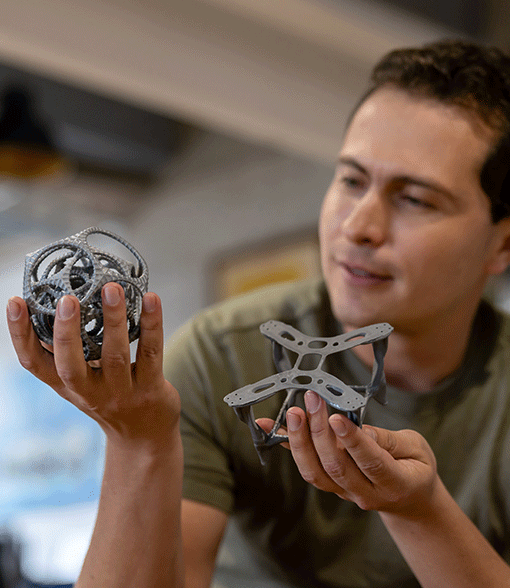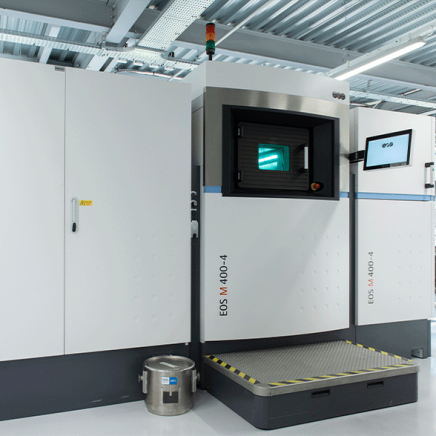Training & Workshops

Mastering design rules
On completion of this training, you will be able to:
- Select the appropriate materials and the suitable technologies to produce your prototypes.
- You will be able to design or re-design 3D printed metal and/or plastic parts.
- You will be familiar with the issues and costs of serial production using metal and/or plastic additive manufacturing.
- Lastly, you will be capable of identifying your parts and products that are suitable and eligible for these production technologies.
As the leader in France, our expertise is unique across the sector. Product design or re-design with up to 120 projects every year developed for our customers. Backed by strong experience of using these technologies in the production of millions of parts, we have developed a comprehensive range of training courses and workshops dedicated to additive manufacturing.
Benefit from custom training
Contact our teamA program suited to your requirements
Learn the issues related to plastic and metal additive manufacturing for a range of applications: prototypes, tools, serial parts, etc… Use our multiple modules to build a custom training course together.
- On our premises and/or on site.
- 1-2 days
- Up to 8 participants.
Level 1: additive manufacturing training programme
The basics of additive manufacturing
- Understand Additive Manufacturing.
- Identify the appropriate materials (plastic and metal) and processes.
- Understand post-treatment and finishes.
Learn the rules related to plastic and metal additive manufacturing for a range of applications (prototypes, tools, serial parts, etc.).
- Design for additive manufacturing.
- Plan support systems ahead.
- Create a self-supporting structure.
- Understand lattice structures.
- Develop a topology optimisation approach.
Understand how Additive Manufacturing is integrated into industrial innovation and its challenges.
- Learn the challenges of additive manufacturing.
- Additive Manufacturing in B2C.
- Handling economic values.
Understand the principal design rules applicable to plastic and metal additive manufacturing. Predict uses: suitability of materials for applications, economic feasibility, etc.
- On our premises and/or on site.
- 2 days.
- Up to 8 participants.
Level 2: additive manufacturing training programme
Technology overview
- Understand Additive Manufacturing.
- Identify the appropriate materials and processes.
- Understand post-treatment and finishes.
Learn design rules for additive manufacturing.
- Design for additive manufacturing.
- Plan support systems ahead.
- Create a self-supporting structure.
- Understand lattice structures.
- Develop a topology optimisation approach.
- Identify the appropriate materials and processes.
- Put into practice with case studies related to the environment in which your company operates.
Predict uses (suitability of materials for applications, economic feasibility, etc.).
- Learn the challenges of plastic and metal additive manufacturing.
- Additive Manufacturing in B2C.
- Handling economic values.
- Identify eligible functions and parts (STRAT).
- Predict design case studies on parts for additive manufacturing.
- Practice on cases related to your industrial environment.
Handle economic values and understand cost factors. Learn design rules. Identify parts eligible for additive manufacturing. Our training courses seamlessly adapt to your requirements thanks to our range of modules; they can be oriented to plastic or metal according to your needs. Use our multiple modules to build a custom training course together.
- On our premises and/or on site.
- 2 days.
- Up to 8 participants.
Level 3: additive manufacturing training programme
Learn design rules for additive manufacturing.
- Design for additive manufacturing.
- Plan support systems ahead.
- Create a self-supporting structure.
- Understand lattice structures.
- Develop a topology optimisation approach.
- Identify the appropriate materials and processes.
- Understand post-treatment and finishes.
- Put into practice with case studies related to the environment in which your company operates.
Predict uses.
- Learn the challenges of additive manufacturing.
- Create a tool.
- Complete the state of the art for the tools.
- Additive Manufacturing in B2C.
1 to 40 participants.
Co-development of custom workshop according to your requirements, useful for going further on specific topics. Our aim is to enable your R&D staff to undertake serial part development projects using plastic and metal additive manufacturing.
Concerning the identification of parts for additive manufacturing:
- Methodology for identifying parts or functions eligible for additive manufacturing.
- Principal material characteristics of metal additive manufacturing.
- Brainstorming session based on customer cases.
Concerning design specific to additive manufacturing:
- Introduction to lattice structures and design techniques.
- Principles and methods for topology optimisation.
- Surface design methods using PTC Creo.
Manufacturing trade rules (DMLS® technology):
- Prepare a metal additive manufacturing job.
- Risk assessment for serial production and industrial validation case file.
- Implementation of main procedures.
« Over 170 technicians and engineers trained in 2 years. »






